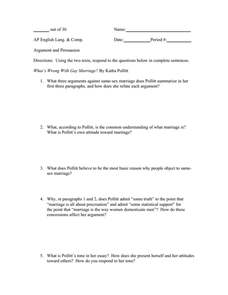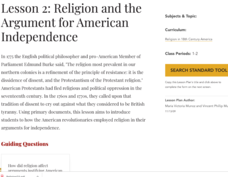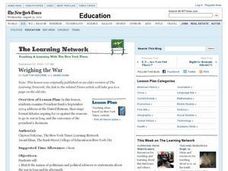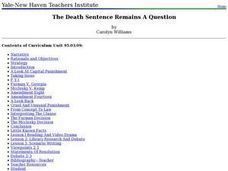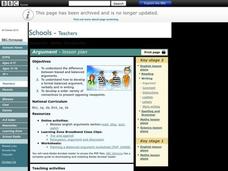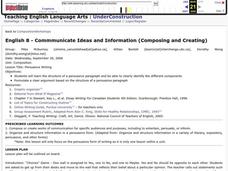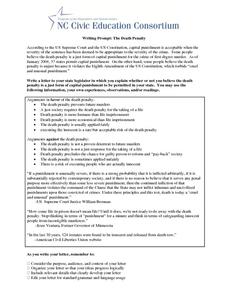K20 LEARN
Argument Is Everywhere: Introduction to Argument
C.E.R = Claim + Evidence + Reasoning. That's the framework behind building a solid piece of argument writing. Introduce young writers to this format with an engaging lesson that uses YouTube videos and a PowerPoint to illustrate the...
Curated OER
Argument and Persuasion: What's Wrong With Gay Marriage?
The topic of gay marriage has gotten lots of attention recently. Without actually asking your class their personal opinions, this two-page activity has pupils study two essays about gay marriage. Readers analyze the attitude, tone, and...
Newseum
Weighing the Arguments
To understand how personal perspectives can affect policy and politics, scholars examine the woman suffrage media map and historical artifacts to analyze arguments for and against women's suffrage. Class members then take on the role of...
Friends of Fort McHenry
Citizens For and Against the War of 1812
Use this exceptional resource to examine the discourse and debate that occurred at the start of the War of 1812 with your class. Learners will first consider their own position on the war in a silent journal writing activity. Then after...
Odell Education
Building Evidence-Based Arguments: “Doping can be that last 2 percent.”
Even the most thrilling sports career can end in an asterisk if the player uses performance-enhancing drugs. Focused on the topic of doping in sports, a seventh grade unit breaks down the arguments for and against steroids in five...
Texas Education Agency (TEA)
Evaluating the Effectiveness of Arguments, i.e., Identify Fallacies (English III Reading)
A series of interactive exercises provide users with the ammunition they need to detect logical fallacies and defend themselves against persuasion. Learners read about 11 types of logical fallacies and identify the type used in sample...
Curated OER
Making a Case
Start the day by sharing opinions about human rights. Then, read "A Defiant Hussein Pleads Not Guilty to Mass Execution" with your middle and high school class. Your pupils research the specific charges in the case against Saddam...
Curated OER
Is That Legal? A Case of Acid Rain
Develop an environmental case study! Elementary learners discover how a case study is used as an analysis tool. The goal of this activity is to show pupils how techniques of persuasion (including background, supporting evidence,...
Kenan Fellows
Unit 4: Bioethics and the Future of Biotechnology
What's the future of biotechnology? Explore a hot topic in the fourth and final unit in a series of Biotechnology lessons. Learners develop an understanding of the many issues in bioethics, then create an argument for or against the role...
Administrative Office of the US Courts
Elonis v. U.S.
With the explosion of social media sites, with online threats and cyber bullying, issues of freedom of speech have taken on a whole new aspect. Elonis v. U.S. represents the first time the Supreme Court has considered whether or not...
Curated OER
What argument?
In this argument worksheet, learners pick different sides to be on for different arguments and conduct a debate on topics such as Facebook, mobile phones in schools, and more. Students conduct debates for 7 topics and fill out other...
Curated OER
Preparing Arguments
Students review the information from the previous lesson on persuasion essays. In groups, they brainstorm a list of arguments to use to support their trip to Six Flags. They also develop counterarguments and gather information to put...
National Endowment for the Humanities
Lesson 2: Religion and the Argument for American Independence
Young scholars examine how religion affected arguments justifying American independence. They read and analyze primary source documents, and write an essay analyzing how Americans used religious arguments to justify revolution against a...
Curated OER
Weighing the War
Study opposing viewpoints with this lesson, which examines President Bush's September 2004 address at the United Nations. Middle schoolers study the text of the address, and then stage formal debates arguing for or against the reasons to...
Curated OER
The Death Sentence Remains A Question
Examine the results of recent opinion polls on where people stand on the issue of the death penalty. In groups, middle schoolers examine various cases dealing with this issue and discuss the judgments. They write their own argument for...
New York City Department of Education
Grade 5 Literacy: TCRWP Nonfiction Reading and Opinion/Argument Writing
Choose a side! Pupils watch and read several nonfiction resources about zoos. After gathering their research, they choose a side either for or against closing zoos. Scholars complete KWL charts, anticipation guides, flow charts, and...
Curated OER
Argument
Students write and discuss opposing points of view. In this argument lesson, students learn to understand what an argument is and they get to argue one side of a disagreement. An alternative written assignment is provided. A worksheet is...
Curated OER
Intermediate Making a Formal Argument: Practice
Does practice really make perfect? What is perfect, and how is it measured? Your aspiring writers will respond to the adage "Practice makes perfect." There's an example answer provided, but consider removing it to see what reasoning they...
Curated OER
Intermediate Making a Formal Argument: Giving and Receiving
Give your middle school writers the opportunity to form an opinion and provide strong supporting details. Writers will respond to the statement "It is better to give than to receive." This is a particularly good assignment to use if your...
National Endowment for the Humanities
A Debate Against Slavery
Slavery is a serious topic that can be challenging for middle schoolers to study. Young scholars can see firsthand through primary sources what occurred during that time period in the United States. The third of five lessons provides...
Curated OER
Persuasive Writing
Eighth graders study persuasive writing. They analzye an editorial for introductory,body, and concluding sentences. They develop arguments for and against various topics in small groups.
Carolina K-12
Writing Prompt: The Death Penalty
Is the death penalty unjust because it violates the Eighth Amendment of the United States Constitution, "cruel and unusual punishment"? Or is it just a form of permissible capital punishment? After weighing arguments for and against the...
Carolina K-12
Compulsory Voting
Should voting in the United States be compulsory? In 2004, fewer than 60 percent of eligible voters cast ballots in the American national elections. After reviewing arguments for and against compulsory voting, your young citizens will...
Curated OER
Rights of the Accused: To Be Confronted with the Witnesses Against Him
Students take on the role of Supreme Court Justices, after reading summary of a case and the arguments for and against a defendant's appeal. They make a decision, write majority and minority opinions, and report their decision.



